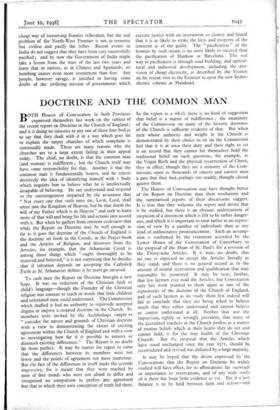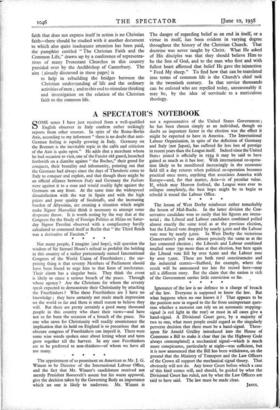DOCTRINE AND THE COMMON MAN
BOTH Houses of Convocation in both Provinces expressed themselves last week on the subject of the recent report on Doctrine in the Church of England ; and it is doing no injustice to any one of those four bodies to say that they dealt with it in a way which goes far to explain the empty churches of which complaint is continually made. There are many reasons why the churches are to a large extent failing in their appeal today. The chief, no doubt, is that the common man (and woman) is indifferent ; but the Church itself may have some responsibility for that. Another is that the common man is fundamentally honest, and he rejects decisively the idea of identifying himself with z body which requires him to believe what he is intellectually incapable of believing. He can understand and respond to the encouragement imparted by the assurance that " Not every one that saith unto me, Lord, Lord, shall enter into the Kingdom of Heaven, but he that doeth the will of my Father which is in Heaven" and seek to learn more of that will and bring his life and actions into accord with it. But when he gathers from eminent ecclesiasts that while the Report on Doctrine may be well enough as far as it goes the doctrine of the Church of England is the doctrine set forth in the Creeds, in the Prayer-book and the Articles of Religion, and discovers from the Articles, for example, that the Athanasian Creed is among those things which " ought thoroughly to be received and believed," it is not surprising that he decides that if salvation depends on accepting the Catholick Faith as St. Athanasius defines it he must go unsaved.
To such men the Report on Doctrine brought a new hope. It was no reduction of the Christian faith to child's language—though the Founder of the Christian religion was content to teach in words that little children and unlettered men could understand. The Commission which drafted it had no authority to supersede accepted dogma or impose a restated doctrine on the Church. Its Members were invited by the Archbishops simply to "consider the nature and grounds of Christian doctrine with a view to demonstrating the extent of existing agreement within the Church of England and with a view to investigating how far it is possible to remove or diminish existing differences." The Report is no doubt far from perfect. It may be matter for regret to some that the differences between its members were not fewer and the points of agreement not more numerous. But the fact of the differences in itself made the accords impressive, for it meant that they were reached by men of free minds who were not afraid to differ and recognised no compulsion to profess any agreement but that to which their own conception of truth led them. In the report as a whale there is no kind of suggestion that belief is a matter of indifference ; the unanimity of the Commission on many of the historic doctrines of the Church is sufficient evidence of that. But when men whose authority and weight in the Church is demonstrated by their choice to sit on the Commission feel that it is at once their duty and their right to set it on record that they cannot for themselves hold the traditional belief on such questions, for example, as the Virgin Birth and the physical resurrection of Christ, they in effect, though they are a minority of the Com- mission, open to thousands of sincere and earnest men a gate that they had, perhaps too readily, thought closed against them.
The Houses of Convocation may have thought better of the Report on Doctrine than their resolutions and the summarised reports of their discussions suggest. It is true that they welcome the report and desire that it be studied, but there is an obvious undercurrent of suspicion of a document which is felt to be rather danger- ous, and which it is important to treat rather as an expres- sion of view by a number of individuals than as any kind of authoritative pronouncement. Such an assump- tion is confirmed by the treatment accorded by the Lower House of the Convocation of Canterbury to the proposal of the Dean of St. Paul's for a revision of the Thirty-nine Articles. It is true, no doubt, that no one is expected to accept the Articles literally as they stand, and there is no general accord as to the amount of mental reservation and qualification that may reasonably be permitted. It may be true, further, that few laymen ever read the Articles, but Convocation only last week pointed to them again as one of the repositories of the doctrine of the Church of England, and of such laymen as do study them few indeed will fail to conclude that they are being asked to believe much that they either understand and cannot believe or cannot understand at all. Neither that nor the impression, rightly or wrongly prevalent, that many of the accredited teachers in the Church profess as a matter of routine beliefs which in their hearts they do not and cannot hold, is for the true health of the Christian Church. But the proposal that the Articles which have stood unchanged since the year 1571, should be reconsidered and revised was defeated by a large majority.
It may be hoped that the desire expressed by the Convocations that the Report on Doctrine be widely studied will have effect, for its affirmations far outweigh in importance its reservations, and of any wide study of it there has been little evidence as yet. But if a just balance is to be held between faith and action—and faith that does not express itself in action is no Christian faith—there should be studied with it another document to which also quite inadequate attention has been paid, the pamphlet entitled " The Christian Faith and the Common Life," drawn up by a conference of representa- tives of many Protestant Churches in this country presided over by the Archbishop of Canterbury. The aim ( already discussed in these pages) is to help in rebuilding the bridges between the Christian understanding of life and the ordinary activities of men ; and to this end to stimulate thinking and investigation on the relation of the Christian faith to the common life. The danger of regarding belief as an end in itself, or a virtue in itself, has been evident in varying degree throughout the history of the Christian Church. That doctrine was never taught by Christ. What He asked of His disciples was that they should believe Him to be the Son of God, and to the man who first and with fullest heart affirmed that belief He gave the injunction " Feed My sheep." To find how that can be translated into terms of common life is the Church's chief task in the twentieth century. In that service thousands can be enlisted who are repelled today, unreasonably it may be, by the idea of servitude to a meticulous theology.











































 Previous page
Previous page